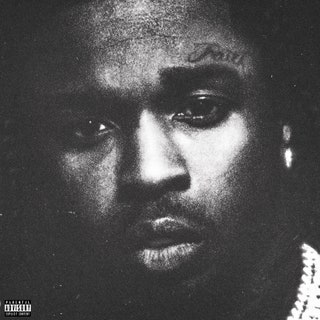Pop Smoke’s debut studio album, “Shoot for the Stars, Aim for the Moon,” was arguably the most significant event in hip-hop last year. Following the 20-year-old’s untimely death in February 2020, the album topped the charts, retaining the ninth-place spot on Billboard’s Top 200 for over a year after its release. The project combined the elements of drill rap present in the Brooklyn-born rapper’s earlier releases — like “Meet the Woo” and “Meet the Woo 2” — with pop influences, showcasing the artist’s growth into more effortless, commercial sounds. Pop Smoke’s newest album, “Faith,” is a continuation of the artist’s legacy. However, the project’s production, features and even its sampling of Smoke’s vocals extinguish the late artist’s personality, raising the question of whether the goal of “Faith” was to honor Pop Smoke or to achieve commercial success.
The album opens with some words from Pop Smoke’s mother, Audrey Jackson, laid over dramatic instrumentals; the speechful, emotion-charged record sets a retrospective — almost philosophical — tone for the album. Although this moving track lays out a strong vision, “Faith” fails to meet those expectations.
Jackson’s 46-second intro is followed by one of the few solo Pop Smoke songs on the album. After an unfortunately uneventful two minutes showcasing some of Pop Smoke’s less potent verses, we see the first of the 21 features on this album. While the collaborations work to the album’s advantage in “Shoot for the Stars, Aim for the Moon,” Pop Smoke often feels like an afterthought in the new release. The artist’s verses are crowded out by featured artists, taking away from the hallmark drill beats and grizzly vocals that made Pop Smoke a name in hip-hop. Especially given the album’s 56-minute run time, the producers had ample opportunity to highlight Pop Smoke’s verses rather than cut together a few insignificant songs. When taking into account “skipping culture” on streaming services and listeners’ tendency to gravitate towards shorter songs, these 2-minute solo tracks seem geared more toward monetary than musical success.
This quest for financial gain doesn’t seem to stop at Pop Smoke’s short solos but extends to the entire album. With its various collaborations, “Faith” aims to expand on the genre-spanning legacy of “Shoot for the Stars, Aim for the Moon.” However, as opposed to seamlessly blending elements of pop and hip-hop music together, many of the tracks on “Faith” end up being painfully dissonant. The best instance of this is on the album’s 16th track “Demeanor” featuring Dua Lipa; Dua’s poppy vocals and the song’s lush production clash with Pop’s verses, distracting from the intensity of Pop Smoke’s vocals. Other records, like “30” featuring Bizzy Banks or “8-Ball” featuring Kid Cudi, while not as audibly confusing as “Demeanor,” fail to deliver the innovative drill production that was a distinct feature of Pop Smoke’s music on “Shoot for the Stars, Aim for the Moon” and prior releases.
A few tracks fall into the same happy medium that “Shoot for the Stars, Aim for the Moon” occupied: featuring other artists while preserving Pop Smoke’s trademark production and personality. “Tell the Vision” featuring Kanye West and Pusha T combines the Canarsie native’s classic drill instrumentals with synth-pop beats. Pop Smoke’s lyricism isn’t as effortless as that of his past work but blends seamlessly with West and Pusha T’s verses. The song samples a segment from “The Voice of New York,” where former host Angie Martinez pays homage to Pop Smoke, followed by a reminiscent verse from the artist. The song is nostalgic as the three artists reflect on their journeys to success. Though the album comes under solemn circumstances, Pop Smoke’s melodious hooks, energetic verses and booming flow exude a celebratory air.
“Manslaughter” featuring Rick Ross and The-Dream is another record that strikes a similar balance. It’s the quintessential pop-rap track: The lush beats and melodies, accented by the strong drums, are fitting under both Ross’ and Pop Smoke’s vocals. The-Dream’s luxurious vocal performance rounds out the track with an ethereal, electropop-inspired sound.
Another highlight is “Bout a Million” featuring 21 Savage and 42 Dugg. In contrast to the rest of “Faith,” the song has more low-key production, with a catchy drill beat and subtle instrumentals. 21 Savage’s nearly monotone verse pairs perfectly with the hard drill beat, and 42 Dugg’s melodious verse interspersed with Pop Smoke’s snappy chorus creates a standout on the album’s tracklist.
The next song on the tracklist, “Brush Em” featuring Rah Swish — another Brooklyn-born rapper — is one of the few true drill rap songs on the album, reminiscent of Pop Smoke’s first releases. Though the song lacks a strong structure, Pop Smoke thrives on this track with his signature gruff vocals over drill beats as one may see on “Meet the Woo.” In tandem with the artists’ unbeatable chemistry on the track, “Brush Em” is easily a highlight and the most classic Pop Smoke record in “Faith.”
While “Faith” contains its fair share of hits, it often feels like a collection of filler tracks rather than a complete body of work. Especially as a follow up to “Shoot for the Stars, Aim for the Moon,” which seemed like the perfect end to Pop Smoke’s journey, the album fails to deliver the same quality. Like many other posthumous releases, the substandard quality of “Faith” leaves listeners with the question of whether the project was created to cherish Pop Smoke’s legacy or exploit it. Many tracks try to achieve a generic, chart-hit sound that unfortunately leaves the album feeling more concerned with profit than with honoring Pop Smoke. “Faith” gives the music industry one last taste of Pop Smoke’s immense talent, though the intent behind its creation remains questionable.
